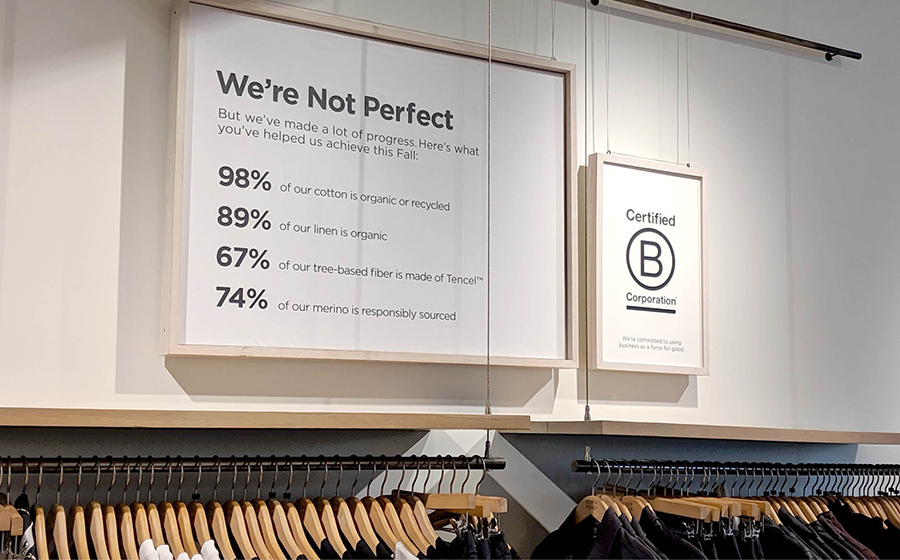To the retail lexicon that includes all manner of subsets and offshoots from e-tail to mobile retail to resale retail to re-retail, perhaps it\’s time to add one more: Right-tailing. The movement of both conventional legacy retailing operations and startups to focus on social responsibility has moved very quickly from a fringe thing embraced at the extremes by tree-huggers and other marginal activists to the very mainstream of the business itself. There\’s no mistaking that this has become a legitimate dynamic on which consumers are basing their purchasing decisions and corporations that are not at the very least looking at this aspect of their business are running the risk of being seriously out-of-step with their customers.
The next question is whether this becomes a fact of retailing or a passing fad supplanted by the next headline-driven variable. Right now, it\’s a big deal. Whether it\’s stores supporting sustainable practices including recycling and second lives for their products, going healthy or removing guns and ammunition from their shelves, this is very real.
Woke Up This Morning, Got Myself a Gun
Certainly, the gun issue has been the one that has captivated retail attention the most. With mass shootings an undeniable part of nearly everyday America, retailers have been responding to the subject very aggressively. Dick\’s, the national sporting goods chain, was probably the most high-profile retailing corporation to ban the sale of certain firearms. Last year, it pulled all assault-style weapons from its stores and then just more recently, it removed all firearms from 125 of its stores, at the same time restricting the sale of certain ammunition products to anyone under the age of 21. The company estimates it has walked away from $150 million in sales revenue so far but the good press – and goodwill – has been substantial.
Walmart, which has seen several of the massacres occur within its stores, announced in August it would stop selling handguns in its last locations that still allowed it while also ending certain ammunition sales after it also raised the purchasing age for certain firearms. Walmart had been even earlier than Dick\’s in dropping assault-style rifles from its stores.
Together the two retailers have been among the largest chain sellers of firearms in the country. At the same, Walmart also said it would ask its shoppers not to carry open firearms in those states where it is legal. Other national retailers have made similar requests, including Kroger, Target, Meijer, Starbucks and Aldi. None of these are outright bans, which some critics continue to call for.
But certainly, by taking these positions, these retailers are hoping to get on the right side of this issue and appeal to gun control advocates who, according to most national polls, make up the majority of the country.
Healthy…Wealthy?
The move to Right Retailing is about more than just guns, however. Several years ago, CVS discontinued the sale of cigarettes and tobacco product at a cost to the drug chain of at least an estimated $1 billion in lost sales. The move came as the retailer pivoted to its CVS Health positioning, a strategy that has proven impactful, though all of those lost sales have not been replaced.
On the environmental and sustainability fronts, stores from all parts of the retail world have jumped on the bandwagon. This includes the secondhand clothing initiatives from Macy\’s, Penney and others who have worked with startups like thredUP or Rent The Runway; the in-house repair programs we\’re starting to see at Nordstrom at its Local stores; as well as a new Harvey Nichols program in the U.K. where shoppers can bring back previously purchased items like shoes and handbags and for a fee have them repaired and reconditioned. Even Ikea, often lauded at the poster child of disposable products, has introduced circular initiatives. The fast-fashion apparel retailers are right behind them.
Let\’s not make any totally altruistic assumptions here. As for-profit corporations, all of these retailers have made a strategic decision that these moves will ultimately be good for their businesses. Social responsibility will only go so far with shareholders, investors and Wall Street.
But as a tactic, it\’s something we really haven\’t seen in the business of retailing over its long history. Certainly the goodwill and customer connections these moves will create are something any retailer in the world would want. In the old days, you\’d even say it was something they\’d kill for.
Warren Shoulberg, having lived in New York for most of his life, assumed that anyone carrying a gun in a store was about to rob the place.




